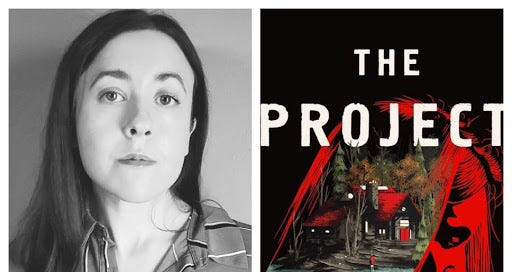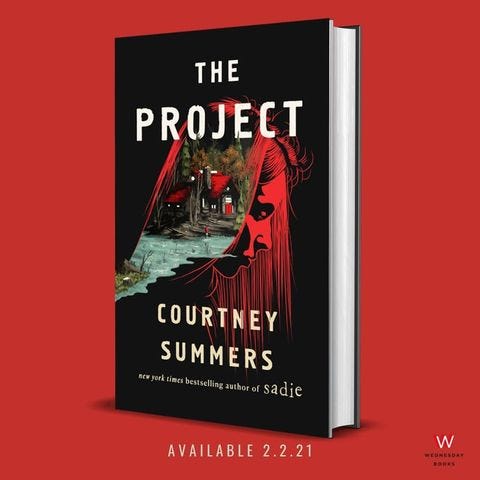How Courtney Summers Sits Down & Writes
Much like Lev Warren's 'Unity Project,' Courtney Summers' latest novel draws you in and doesn't let you go.
"The Unity Project saved my life."
Lo Denham is used to being on her own. After her parents died, Lo's sister, Bea, joined The Unity Project, leaving Lo in the care of their great aunt. Thanks to its extensive charitable work and community outreach, The Unity Project has won the hearts and minds of most in the Upstate New York region, but Lo knows there's more to the group than meets the eye. She's spent the last six years of her life trying—and failing—to prove it.
"The Unity Project murdered my son."
When a man shows up at the magazine Lo works for claiming The Unity Project killed his son, Lo sees the perfect opportunity to expose the group and reunite with Bea once and for all. When her investigation puts her in the direct path of its charismatic and mysterious leader, Lev Warren, he proposes a deal: if she can prove the worst of her suspicions about The Unity Project, she may expose them. If she can't, she must finally leave them alone.
But as Lo delves deeper into The Project, the lives of its members, and spends more time with Lev, it upends everything she thought she knew about her sister, herself, cults, and the world around her—to the point she can no longer tell what's real or true. Lo never thought she could afford to believe in Lev Warren . . . but now she doesn't know if she can afford not to.
Welcome to The Unity Project.
If you enjoyed Courtney Summers’ previous novel Sadie, then The Project is a must-read. True Crime fans will also want to pick this one up ASAP.
We caught up with Courtney to chat about the terrifying thrill of pantsing over plotting, the allure of cults as subject matter and what she’s been reading.
Q: Where and when do you like to write the most?
I do most of my writing at night, at my desk, facing a wall away from the window which is a terribly uninteresting—and slightly bleak—answer, I know! I have a feeling keeping it that simple helps me keep focus, though.
Q: Are you more of a plotter or pantser?
I used to be more of a pantser and have ended up more of a plotter. I always like to leave a little room for having absolutely no idea what I’m doing next, just to keep it terrifying.
Q: Stephen King has a great line in On Writing that says “the scariest moment is always right before you start. After that, things can only get better.” That scary pre-start moment often inspires procrastination in writers. Suddenly, you have to clean your entire house, do the laundry and play Candy Crush for an hour before you can actually start writing. Is there anything you need to do before you can actually sit down and work?
The longer I’ve been doing this, the more I’m realizing I have to let a book marinate before I actually sit down to begin. It’s not even procrastination—it’s part of the process, but I find it infinitely frustrating because there’s nothing more exciting than digging into those first few pages and meeting your characters and establishing their voice. It’s when I’m fully enmeshed in a book that I start looking for reasons not to work. Luckily, the Internet always provides distractions!
Q: Do you listen to music while you write? If so, what music? Is your choice of music inspired by the manuscript you’re working on?
I love to listen to music when I write, and it’s usually something that complements the scene I’m working on—so a sad song for a sad scene. When I edit, I need silence. And that’s when I find out if the scene I wrote at the time actually reads sad, or it only felt like it because of the music!
Q: What’s one piece of advice you’d give a writer just starting out on their first draft?
Don’t get too caught up or distracted by the idea of craft or what it means to be a writer. Writing is words on a page, and that’s that. And one word written is always one more than you had.
Q: Where do you normally find story inspiration?
Something I’m consistently exploring in my work is violence against women and the ways we fall short for victims and survivors. I wouldn’t say that I’m inspired by that—but outraged. My books are often a response to the anger I feel about certain issues and serve as a confrontation of those issues. I want readers to finish my books feeling similarly outraged and asking themselves: ‘okay, if this is how the world is, how do I change it?’
Q: The Project is your seventh novel. How has your writing process changed from when you were first starting out?
My books have become steadily more ambitious and greater in scope since I began. My earlier books are much more internal and character-driven. I haven’t sacrificed the interiority in my newer works, but the worlds that surround them have gotten much bigger.
Q: The Project takes place over two timelines—Lo in the present as she searches for her sister Bea, and Bea’s perspective, which covers the years she’s been a part of The Unity Project. How did you decide to put Lo’s chapters in the first person and Bea’s in the third person?
I wrote the entire first draft of The Project in Lo’s perspective only and something felt like it was missing—when my editor suggested the addition of Bea’s perspective, it all fell into place. Bea’s voice ‘arrived’ in third person. It was less a conscious choice than what happened the moment I started typing. So I guess it was pretty instinctual. I love it. I think third person really helped add to the dreamlike, feverish quality of her side of the story.
Q: What made you want to explore cults and how people get drawn into them for this story?
Most people don’t believe they’d join a cult and I really wanted to write a book that challenged that perception. I think when we stand back and insist we would never be so foolish as to fall prey, there’s a real lack of empathy in that response. I wanted to show readers how easy and how very human it is to find themselves in that kind of situation.
Q: The suspense and pacing in The Project make the book nearly impossible to put down. How do you ensure you find that rhythm while drafting and editing?
Thank you so much! I know less about how I find the rhythm and more when I lose it—things just completely grind to a halt and then I have to revisit everything I’ve written to figure out what’s stopped working. I also have an editor who is very, very good at keeping me on track.
Q: What was the last book you read that you couldn’t put down?
In the Quick by Kate Hope Day, which was beautifully written, contemplative and incredibly suspenseful.
Pick up your copy of The Project at bookshop.org, IndieBound, or Barnes & Noble. Happy Reading!
Sit Down and Write is brought to you by Emily Lee and Cassie Stossel. For more author interviews like this one straight to your inbox, subscribe below!





